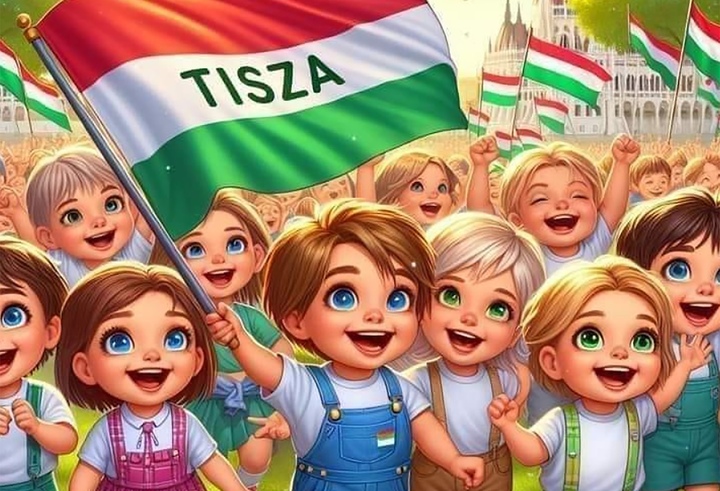Has a cult of personality, sectarian blindness, or something completely different developed around the leader of the Tisza Party? And how dangerous is this social phenomenon identified as group hypnosis? Written by Tamás Pataki.
The Tisza Party (aka Péter Magyar) has a public supporter group of 164,000 people on Facebook. Hundreds of people post daily in this experimental public, which will eventually be followed by other, perhaps more official, channels. There are plenty of celebrity supporters, most recently the comedian András Somogyi showed up and became a pet of Péter Magyar, but Róbert Puzsér and Péter Kóczián also surrendered to the apostle Peter, who was elevated to eschatological heights.
Péter Magyar accuses the Hungarian public media (and Fidesz) of locking the Hungarians in their own opinion bubble, so he decided to do the same thing, since his supporters don't notice this anyway in the age of postmodern warfare, in which the facts are no longer the master.
Tisza bubble
In the Facebook group, it is obvious that Péter Magyar's supporters engage in everything and everyone who hurts their leader with the most determined decency mentality. Dissidents are quickly silenced by the most determined Peterian guardsmen (for example, someone mentioned why there are so many children in demonstrations and political pictures, after all, their hated opponents do the same; but what Jupiter is allowed to do...).
But that's just the chattering surface. Deep down, it's something completely different.
If we analyze the dynamics of this group from a psychological point of view, a frightening and worrying phenomenon emerges. There are ladies who paint the Tisza logo on their nails, others bake a Tisza cake for their husband's birthday - or directly for Péter Magyar, as a gift - they place their children next to Péter Magyar for a photo, which will probably soon replace the boring wedding photography at home; there are people who have t-shirts and mugs made (they don't order from the party's web store, but take their time), generate Tisza pictures with artificial intelligence, pose at demonstrations, write passwords next to the pictures, and there are even confectioneries that sell Tisza ice cream. Others write and spread anecdotes about sympathizers who cannot publicly express their opinions because of their jobs, and so on. There is also a lady who enthusiastically reports that her daughter gave a medal she won at an amateur sports event to a Hungarian (of course, the mother pocketed the likes for her daughter's generosity).

Source: Democrat
This phenomenon can simply be called sectarianism or a personality cult reminiscent of communism. Of course, sect is a religious concept, which, if we want to use it in political analysis, would lead us to a dead end; the cult of personality is usually a phenomenon controlled or forced by a politician, it is not formed as spontaneously as this one. What we see here is nothing but the phenomenon of mass formation.
Whose mass is it?
Mattias Desmet, professor of clinical psychology at the Department of Psychoanalysis and Counseling Psychology at the University of Ghent, described this phenomenon in detail The Psychology of Totalitarianism , in which he states, among other things, that the
"mass formation is essentially a form of group hypnosis that deprives the individual of the ability to maintain critical distance and moral awareness".
Péter Magyar and his supporters do not seem to be bothered by the fact that he owes his wealth and quality of life - together with the fire-red BMW - to the "system" of which he has now become a fierce enemy; just as his ex-wife's detailed account of the "difficulties" of their private lives did not disturb the cognitive field of his followers. In the phenomenon of mass formation, it does not matter what the individuals think, what is important is that they think it together. This is how the masses reach the state in which they accept even the most absurd ideas as true, or at least behave as if they were true.
According to Desmet, this cognitive blindness can be attributed to the fact that from the point of view of mass formation, it is not the frustration and aggression that is actually unleashed, but rather the aggression present in the population that has not yet been unleashed, that is, the violent tendency that is still looking for its target.
Péter Magyar thus successfully channeled the accumulated social discontent, promising that the government could finally be overthrown under his leadership, thereby pointing out who is responsible for these accumulated tensions and anxiety.
All this invites another, more individual phenomenon.
In a photo circulating on Facebook, a young mother took a selfie while pushing a stroller while distributing Tisza leaflets in her village or town, even before the elections. She smiles widely, the baby is sleeping in the background, and she reveals about the lady that she expects (or expects) hundreds, even thousands of likes for this picture, because even as a new mother, she does everything for joint success, and she wants to show this, in Hungarian for popularity hungry. It can be said about the people who post in most groups that they are hungry for popularity and love, and nowadays this can be obtained in the simplest and most direct way by saying, pretending to be a Tisza supporter, or representing themselves as such on social media or at rite community events (demonstrations). The virtual mass formation has already reached the stage where if someone is a fan of Péter Magyar, he will also receive from the others the confirmation and confirmation that he always wanted, but did not get in his work or private life.
And if the simple person who wants likes and love perceives that it is cool to be a sissy, then in this political field the individual can easily reap the likes that he does not get in other areas of his life, and if it is a cool thing to be a sissy, then it is a cool thing will vote for the Tisza.
And this phenomenon is not only virtual, but certainly real: this important tool of mass formation - which Péter Magyar now uses with a professional staff - is based on the fact that
it gives the crowd you've assembled a community experience that they've never had from any other party; for example, this is why he makes his crowd sing and uses other political ritual elements surprisingly well.
The Péter Magyar phenomenon is dangerous because it has become a self-stimulating mass psychological phenomenon. Mattias Desmet The Psychology of Totalitarianism , and I would like to quote a longer part of the work so that we can understand the psychological causes of current political processes:
"the essence of mass formation is the following: a society saturated with individualism and rationalism suddenly turns to its total opposite, radically irrational collectivism.
To use a classic Nietzschean phrase: Dionysus overthrows the dictatorship of Apollo in one fell swoop and takes power in society. This is also immediately clear: solidarity with the collective is the main reason for joining any large mass formation. And those who do not participate are typically accused of lacking civic responsibility and altruism. This is one of the reasons why
the absurd elements of the narrative do not actually play any role for the masses: the masses do not "believe" in the narrative because it is correct, but because it awakens in them a new sense of belonging.
The strategy of dealing with the object of fear fulfills the full function of the ritual. The function of ritual behavior is to create group cohesion. It is a symbolic behavior aimed at subordinating the individual to the group. As such, it is best to have as little practical benefit and sacrifice as possible on the part of the individual.”
The myriad of micro-stories, voluntary leafleting, festival demonstrations, cake baking and many other elements of this phenomenon can be understood through Mattias Desmet's perspective system. The Tisza camp and the Péter Magyar phenomenon perfectly meet the Desmet criteria, and the crowd can also attract those who have been left out of its sphere of attraction until now, because it makes you pretend: if you are not with us, then you are an enemy (Fidesz in Hungarian). Mass formation divides society, and the space in between is constantly narrowing, so you have to choose a side quickly, because the Tisza is flowing.

Source: Social media/Democrat
To flow or not to flow?
All of this could be a warning sign for Fidesz, as there was a time when voting for Fidesz was considered a very cool thing, but today it is not necessarily the case. It is an interesting phenomenon that Péter Magyar was mostly in the agglomeration where the beneficiaries of the right-wing government live or where they have moved, and where they would have the least reason to be dissatisfied (the statistical data also shows that the highest proportion of chocolates were recruited in the county of Pest, in Hungarian for the agglomeration settlements directed).
The real danger for Fidesz is not the opposition, nor Péter Magyar, but the increasing anger, frustration and anxiety towards it, which is not an extraordinary phenomenon in the case of a 14-year-old government, except that now someone has appeared on the political scene who does this channel it into a crowd. So – in agreement with Leventelemez –
it is not certain that these people will vote for Péter Magyar, but against Fidesz, and the more the crowd grows, the more they will like it.
Péter Magyar is a new player, he fits well in the West - see Manfred Weber's courtship - even an undecided person can vote for him with a good heart against the current "system". In addition, Magyar wants to be like Viktor Orbán in everything, he also met Manfred Weber in a place - based on the pictures, probably on the terrace of the Hilton - from where he had a picture taken, which Viktor Orbán used to post from Karmelita when his important guests arrive.
The Hungarians consciously play on certain Orbán elements, while consciously and loudly distancing themselves from others, and in accordance with the psychology of mass formation, all this does not cause cognitive confusion in the followers, but only increases their fandom.
The following quote from Mattias Desmet provides an important clue regarding the relationship between Tisza supporters and politics, as well as the public: "the masses are extremely intolerant of other opinions and have a strong tendency towards authoritarianism. Dissident voices for the masses
1) they appear antisocial and hostile because they refuse to participate in the bond created by mass formation;
2) they are completely unfounded, because in the narrowed attention span of the masses, critical arguments are given neither intellectual nor emotional weight;
3) they are extremely repulsive because they threaten to break the intoxication and thus fall back into the negative state that preceded the mass formation (which is the lack of social connection and sense of purpose, indefinable fear and restlessness);
4) they are extremely frustrating because they threaten to deprive you of the experience of experiencing latent aggression.”













